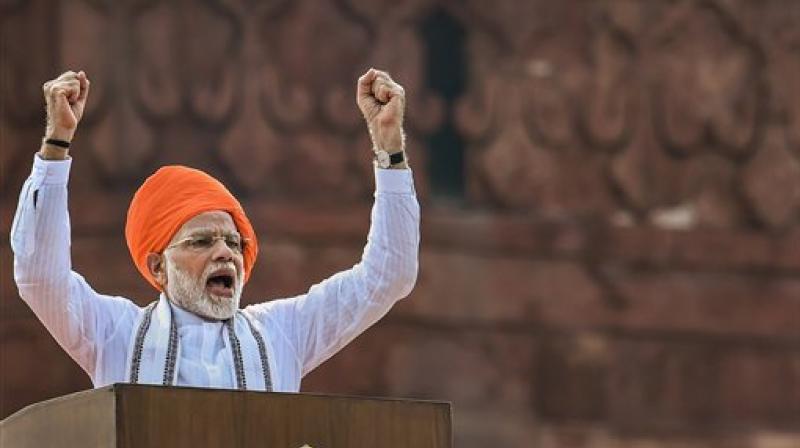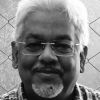PM, at Red Fort, goes all out for Polls 2019
The Prime Minister has perfected the typical Indian trait of vilifying one's predecessors.

Prime Minister Narendra Modi tried to present himself as a strong, decisive and risk-taking leader in the last Independence Day speech of his tenure. However, he could not go much beyond repeating the same laundry list of achievements that he had presented in his reply to the motion of no-confidence in Parliament last month. Such re-runs can only lead to diminishing returns as public faith in politicians is limited.
The Prime Minister’s address comes in the immediate wake of opinion polls showing that the ruling BJP was likely to lose the forthcoming state Assembly elections in Rajasthan, Madhya Pradesh and Chhattisgarh. It also comes a day after the chief election commissioner has categorically ruled out the possibility of extending the life of the legislatures in these states. This wrecks the BJP’s plans of holding the parliamentary and 12 state Assembly elections simultaneously in February 2019. Prime Minister Modi had hoped that if simultaneous elections were held, his personal image would help to overcome local anti-incumbencies.
Mr Modi’s speech did address some factors that could contribute to anti-incumbency against him. By reinventing himself as the champion of social justice, he addressed the political threat his party faces from dalits, Other Backward Classes, tribals, farmers, unemployed youth and minorities. However, the record of his government on these issues is quite poor.
Would restoration of the provisions of the Scheduled Caste and Scheduled Tribes (Prevention of Atrocities) Act, for example, assuage the dalit youngsters of the Bhim Army jailed in Uttar Pradesh after the Saharanpur violence or those who have been unfairly jailed in the Bhima Koregaon violence, instigated by known Hindutva provocateurs? Would giving statutory status to the National Commission for Backward Classes turn the OBCs into BJP supporters? Would the families of farmers who have committed suicide believe that their incomes have gone up? Such constant hype could easily be reduced in the public mind to nothing more than irritating noise.
The Prime Minister has perfected the typical Indian trait of vilifying one’s predecessors. But the spectre of Prime Ministers past — especially from the Congress — continues to haunt him.
He would have the nation believe that only his government is building toilets, IITs and IIMs, supplying electricity to unelectrified villages, supplying cooking gas, laying optical fibre networks, building highways and unleashing wild entrepreneurial spirits thorough skill development programmes. That before he descended on Raisina Hill, India was backward, lethargic and unambitious. That it was afraid of using its armed forces effectively until he launched “surgical strikes” against Pakistan.
It does not occur to him that the first IIT was set up in September 1950 in the same month that he was born; that rural electrification began three years before his birth and 97 per cent of villages were electrified before he became the Prime Minister; that the first state and central tractor organisations for supply of tractors were also set up in 1947; that when he was barely eight years old India had embarked on the Green Revolution and that great businessmen like Ghanshyamdas Birla, Ardeshir Godrej, Govindram Seksaria, Jamsetji Tata, Jamnalal Bajaj, Walchand Hirachand Doshi, Kailash Chandra Mahindra and many others had unleashed Indian entrepreneurial spirits long before he claimed to uncage them. India had also won four wars with Pakistan before Prime Minister Modi’s “surgical strikes”, which neither stemmed terrorist attacks nor established peace with Pakistan.
Even high rhetoric would be tolerable if it were backed by facts. Prime Minister Modi’s “achievements” on the minimum support price being raised to one and half times the farmers’ cost of production, on Army pensions and on open-defecation free villages remain contentious.
The youngsters who used to chant his name at every rally will not be happy when they are told to think out of the box, such as frying pakodas by tapping gas from open sewers. Neither are they going to buy his claim that livelihoods exist, but the statistics do not report them.
As for his flagship scheme of Ayushman Bharat, one wonders how many times it will be re-announced before it becomes clear that the meagre funds allotted for it will never make it viable.
It may seem novel for the Prime Minister to take up the issue of women’s security in his Independence Day speech. But what credibility can his statements carry when a minister in his government, Rajen Gohain, is accused of rape, and when his party’s ministers defend rapists from Uttar Pradesh to Jammu and Kashmir.
It was also difficult to believe him on the issue of Jammu and Kashmir. The number of civilians killed in J&K, the rise in recruitment to militancy and his government’s refusal to talk to either the separatist leaders or open a dialogue with Pakistan belie his claims of following the principles of “Insaniyat, Jamhuriat and Kashmiriyat” (humanity, democracy and Kashmiri culture) first enunciated by Atal Behari Vajpayee.
The Prime Minister clearly needs a new narrative for the 2019 campaign. Promising a manned mission into space or taking credit for the Mangalayan project, which was never his baby, is no substitute for a coherent vision.
If his attempt was to refurbish Brand Modi for the coming electoral battle, then it should be clear this cannot be achieved through stale rhetoric alone. The speech at the Red Fort also showed that Prime Minister Modi’s charisma has started ebbing.
The Indian people expect their Prime Minister to demonstrate contemplation and thoughtfulness on Independence Day in addressing the issues that threaten to tear asunder the fabric of the nation. But he refused to address the issues of mob lynching, cow vigilantism, the hatred being spread against the minorities, and violence against dalits. A visionary leader would have taken these issues that have created disquiet and divisiveness in society head on. For that one does not have to be “becahin, vyakul, vyagra, adhir aur atur (anxious, disturbed, restless, fretful and impatient)”. These are only signs of someone going all out to seek re-election.
H10

